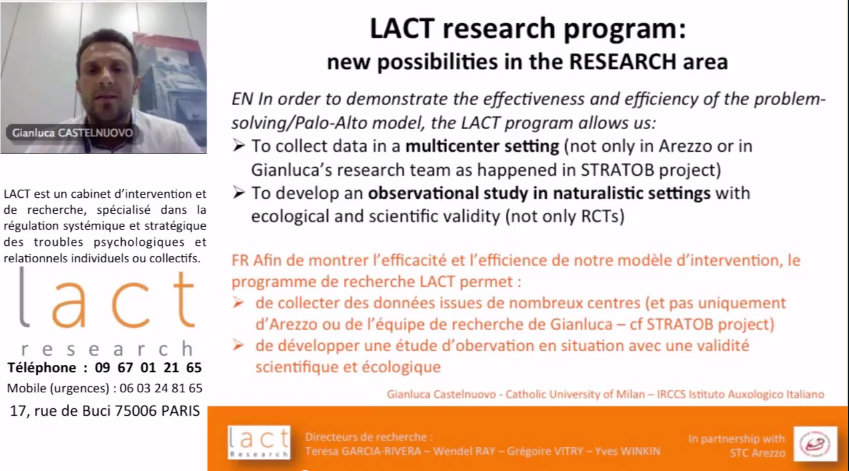LACT research program: new possibilities in the RESEARCH area

EN In order to demonstrate the effectiveness and efficiency of the problem-solving/Palo Alto model, the LACT program allows us:
- To collect data in a multicenter setting (not only in Arezzo or in Gianluca’s research team as happened in STRATOB project)
- To develop an observational study in naturalistic settings with ecological and scientific validity (not only RCTs)
FR Afin de montrer l’efficacité et l’efficience de notre modèle d’intervention, le programme de recherche LACT permet :
- de collecter des données issues de nombreux centres (et pas uniquement d’Arezzo ou de l’équipe de recherche de Gianluca – cf STRATOB project)
- de développer une étude d’obervation en situation avec une validité scientifique et écologique
- To compare our strategic-systemic diagnosis with the official DSM-5 based diagnosis
- To consider our therapeutic results also in relationship with the DSM-5 criteria (the DSM cut-off for each psychopathology)
FR : il est nécessaire d’utiliser le diagnostic DSM-5 permettant :
- De comparer notre diagnostic systémic stratégic avec le diagnostic officiel DSM
- De considérer nos résultats thérapeutiques au regard de ceux du DSM-5
It is necessary to use standardized tests/scales allowing us:
- To collect evidences of our strategic-systemic psychotherapies in terms of effectiveness and efficiency
- To compare our strategic-systemic psychotherapies with the other evidence-based or empirically-supported treatements (first of all CBT, as happened in STRATOB)
FR : Il est nécessaire d’utiliser pour cela des test/échelles pour :
- Recueillir des évidences concernant l’efficacité de notre modèle
- Comparer notre approche avec celle d’autres d’approches basées sur des traitements empiriques (TCC notamment)
EN : To avoid problems with a too long test, the LACT scientific group is selecting a brief and validated scale that has to be used in each session (before starting the session):
- OQ-45.2 – Outcome Questionnaire by Lambert(used in STRATOB)
- Other scales (please see the next slide)
FR : Afin d’éviter des test trop longs, l’équipe de recherche travaille actuellement à la mise en place d’un questionnaire rapide :
- OQ-45.2 – Questionnaire Lambert (cf STRATOB)
- Autre échelle (slide suivant)
The following six widely used outcome measures were selected as the best scales:
FR : Les 6 mesures suivantes ont été sélectionnées parmi les meilleures échelles :
- Behavior and Symptom Identification Scale-24 (BASIS-24; Eisen, Normand, Belanger, Spiro, & Esch, 2004)
- Clinical Outcomes in Routine Evaluation Outcome Measure
(CORE-OM; Evans et al., 2000) - 4
- Depression Anxiety Stress Scales (DASS; Lovibond & Lovibond, 1995a)
- Health Survey Short Form-36 (SF-36; Ware, 1999); OQ-45 (Lambert, Burlingame, et al., 1996)
- SCL-90-R (Derogatis, 1983) and BSI (Derogatis, 1993)
- Patient Reported Outcome Measurement Information System DSM-5 based version (PROMIS; Pilkonis et al., 2011)







